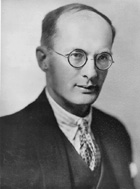
Born: April 7, 1884, Cracow, Austro-Hungarian partition of Poland (presently Poland)
Died: May 14, 1942, New Haven, Connecticut, USA
The early days. His father Lucyan, from a noble Polish family, was a linguist. Mother: Jozefa. Malinowska attended King Jan Sobieski public school in Cracow.
Higher education. In 1908, after studying at the Jagiellonian University in Cracow, he received PhD in Philosophy, Physics and Mathematics with the highest honors in the Austro-Hungarian Empire (Sub auspiciis Imperatoris). After that he went to Leipzig (Germany) and from there, in 1910, to London, where he did research at the British Museum and attended the London School of Economics. In 1913 he also lectured there and in 1916 received PhD in Science.
Marriage. University positions. In 1919 he got married in Australia and, because of poor health (he suffered from TBC all his life), moved to Canary Islands. He held many positions at the university level including the University of London where he was named the Reader of Anthropology in 1924, the first Chair of Anthropology in 1927 and a Professor the same year. He lectured at Cornell University in 1933 and three years later at Harvard University where he received an honorary doctoral degree. He served as a Visiting Professor at Yale University during 1939.
Worlwide recognition. Though fieldwork and various jobs occupied much of his time, he managed to deliver many lectures in cities worldwide such as Geneva, Oslo, Vienna and Rome. Malinowski originated the school of social anthropology known as functionalism, holding the belief that all components of society interlock to form a well-balanced system.
He emphasized characteristics of beliefs, ceremonies, customs, institutions, religion, ritual and sexual taboos. His New York Times obituary named him an "integrator of ten thousand cultural characteristics." Other fieldwork included travel to Africa where in 1934 Malinowski and Radcliffe Brown brought together a generation of anthropologists who documented African tribal societies (Swazi, Bemba, Chagga, Bantu Kavirondo) through excellent fieldwork. He also visited the Oaxaca Valley of Mexico from 1941-42. One of Malinowski's major achievements was a satisfactory integration of cultural theory with psychological science. Malinowski is famous for his lectures and influential writings. His magnetic manner drew and inspired many of his students to pursue various occupations, mainly in the field of social anthropology. Malinowski died on May 14, 1942 in New Haven, Connecticut.
Honors:
Delegate of London University to Harvard Tercentenary; Honorary DSc (Harvard), 1936; Lecturer at Oslo Instituttet for Kulturforskning, 1936; Corresponding Member of Polish Academy of Science, 1930; Correspondent of Italian Committee for Study of Population Problems, 1932; Member of Royal Academy of Science of Netherlands, 1933; Honorary Member of Royal Society of New Zealand, 1936; Correspondent of Institute for Comparative Study of Cultures, Oslo, 1936.
Sources:
Minnesota State Univ.
Wikipedia
Columbia Encyclopedia
Encyclopedia
LSE Library
Return to home page:
Prominent Poles